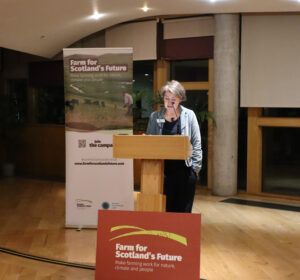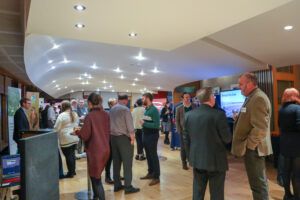On 6 March, LINK held a Holyrood Parliamentary Reception, bringing people together around the Farm for Scotland’s Future campaign.
We started with two short videos from two very different farmers, both working with nature to the benefit of their businesses. First Johnnie Balfour, who farms in Fife, talks about doing more for nature and climate by working with nature, by, for example, reducing his inputs.
Then Padruig Morrison, in the Outer Hebrides, who is changing the way he is using the croft to manage for biodiversity and climate. He suggests how more crofters can be supported to use their land for food production and biodiversity and climate.
They both highlight problems with the current system of farm funding. You’ll see, just in the background, how different their farming environments are. Clearly they both need flexibility to do things at a time of year that suits their local area, but they also both talk about the size of farm units and how having a system that rewards farmers and crofters for results (or outcomes) will achieve more for nature and carbon.
These two short clips demonstrate the need for change in our current system of farm support in Scotland. Here we have a farmer and a crofter who are producing food but who also want to deliver for nature and climate. And it makes complete sense for them to do so.
If we care about food producers, and if we care about food security, then we need to care about our environment. We all rely on farming, and farming relies on nature. The food we grow depends on healthy soils; our crops need pollinators; and our farmers need a stable climate and resilience to extreme weather. Anybody who presents producing food and protecting our environment as competing aims is being extraordinarily short sighted.

LINK’s Chief Officer Deborah Long at the Farm for Scotland’s Future reception
But we do need to change how we farm in order to be more sustainable. As well as producing food, farmers and crofters manage three-quarters of Scotland’s land. However, many current agricultural practices cause pollution, severely harm our wildlife, and make the sector Scotland’s second-largest source of climate emissions. At the same time, Scotland spends more than £650 million a year supporting farmers. The opportunity in front of us right now is to use that money to support farmers and crofters to move towards nature-friendly and climate-friendly food production.
We deliberately started with those two clips to show that this approach is not just feasible, it is vital. The Farm for Scotland’s Future campaign is working with more than 40 organisations and farming groups who all want to see change so that farmers are able to build and maintain viable businesses in the future: ones that are resilient to climate change, ones that help put back species and habitats so our ecosystems are more resilient to ongoing change and ones that produce healthy food and products, that support rural communities and will form viable business legacies for future generations.
The campaign is looking at how agriculture support is distributed today, what it ‘buys’ today and what it could ’buy’ in the future. It is looking at what opportunities the current Agriculture and Rural Communities (Scotland) Bill is opening up for us, whether we are farmers or rural businesses, or members of Scottish society. We are all working together to call for a better farming support system that supports nature restoration and tackles climate change while supporting all farmers and crofters in the transition to sustainable agriculture.
You can find out more about the intricacies of the advocacy work we are doing in partnership with farmers and crofters to make the most of this opportunity we have in the Agriculture Bill here.
Meanwhile, in another short video, Vicki Swales, from RSPB Scotland, talks about the importance of nature in farming and the benefits it brings. And what the Scottish Government and we, as consumers, can do to support farmers to take action for nature and climate.
The Farm for Scotland’s Future campaign has 3 simple asks:
- Replace the decades-old farm funding system with one that works for nature, climate and people.
- Ensure at least three quarters of public spending on farming supports methods that restore nature and tackle climate change.
- Support all farmers and crofters in the transition to sustainable farming.

Guests at the Farm for Scotland’s Future reception
For the current financial year 2023-24, only about five percent of the Scottish government’s £650 million farm support budget is being spent on dedicated support for farmers to deliver targeted environmental benefits like restoring habitats for priority species, improving water quality and mitigating climate change. In contrast, for the current financial year more than two thirds of the farming spend is being paid to farmers as ‘direct payments’ based on how much and what type of land they farm, with very few environmental conditions attached. These payments disproportionately benefit the largest landowners and do very little to support sustainable farming.
Is there a better way of doing this? Of course there is. By replacing the current old system, a new system could and should pay farmers, crofters and land managers to farm in ways that are sustainable.
In February, the First Minister has announced that, after the passage of the Agriculture Bill, at least 70% of funding will be paid across the bottom two tiers of the new system – effectively continuing the current approach where most money is spent on direct payments. In effect this means the new system is likely to direct only a little more of the farming budget to helping restore nature and tackle climate change – a small step forward, but not nearly far enough.
A business as usual approach will not put farming on the path to sustainability. It will leave those farmers and crofters who are working in ways that help nature and the climate without enough support, and it risks leaving our farming sector out of step with the growing consumer demand for environmentally friendly food.
As we heard from Padruig, smaller Scottish farms and crofts often support more biodiversity and rely less on chemical inputs than larger farms, yet they lose out under the current funding system. We’re calling for a higher rate of base level direct payments for the first hectares a farmer or crofter claims, making the system fairer and supporting nature-friendly methods.
We’re also calling on the government to set itself ambitious targets for increasing organic farming and helping farmers reduce the use of pesticides and synthetic fertilisers.
It’s important we keep talking about all this. With the rise in misinformation and the framing of environmental issues as elitist or exaggerated, the more we talk to colleagues, friends, neighbours about what is actually happening with nature, what is really happening with carbon and climate, the better. The possible futures in front of us that models are describing should both scare and re invigorate us. Now is the time to take on the false binary approaches of some on social media, illustrate what is happening but also what solutions of hope look like. Remember crofters like Padruig and farmers like Johnnie who are doing what they can but clearly want to do more and want to inspire others to accompany them on the journey. These are just two voices – there are many more out there. Just as there are many more people in Scotland, and the rest of the world, who want to see change. Sometimes we just don’t hear their voices loudly enough.
We can none of us do this alone. It is only through mature and far sighted conversations, embedded in mutually beneficial partnerships that we will see the swing towards the resilient and enjoyable future that we all need and that future generations, quite rightly, expect to have.
Join the campaign here.
By Deborah Long, Scottish Environment LINK’s Chief Officer
Top image credit: © David Bebber/ WWF-UK
